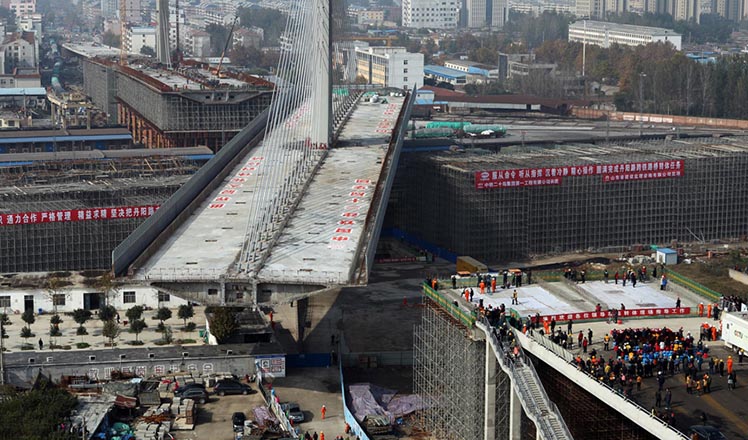E-Commerce in China heading in new direction
Updated: 2016-11-11 16:54
(Xinhua)
|
||||||||
BEIJING - After eight years of wild growth, China's e-commerce industry is seeking new ways to prosper.
The Singles' Day online shopping bonanza, which happens in China on November 11 every year, showcases the rise of online retailing platforms such as Vipshop, JD and Alibaba.
While turnover of domestic e-commerce companies ballooned from 52 million yuan ($7.6 million) in 2009 to 91.2 billion yuan in 2015, traditional "bricks and mortar" retailers are losing ground.
British retailing giant Marks & Spencer announced on Wednesday that it will shut its 10 stores on the Chinese mainland and lay off more than 400 workers, the latest in a growing list of major western retailers such as Best Buy and Tesco to pull out of a difficult market.
Though e-commerce has seen explosive growth over the past eight years, widespread fraud now haunts online retailers that fail to take appropriate measures.
Just before Singles' Day, the State Administration for Industry and Commerce held talks with the country's 15 leading e-commerce companies, telling them that price fraud, false advertising, unfair competition, sales of fake and shoddy goods, as well as scalping were strictly prohibited.
Even for sales-record holder Alibaba, Singles' Day is a double-edged sword. The company's earnings and share price usually slump in the first quarter of the year after climbing to giddy half-year or full-year highs in November.
"E-Commerce should not develop like a campaign because the economy needs steady growth," said Zhang Li, an e-commerce expert with the Ministry of Commerce.
Zhang noted that generally speaking, e-commerce has a positive impact on the real economy and national economic development. "If it brings a negative impact, the investment-driven business mode should be blamed," she said.
Set to tap the country's growing e-commerce industry, a huge amount of capital has flooded into the sector, but the pace of consumption growth has failed to match the rapid expansion of online platforms. That has led to price wars between e-commerce companies, which have hurt traditional retailers.
A hopeful sign is that many e-commerce companies are reflecting on issues such as how to integrate online and offline marketing and the influence of Singles' Day on inventories.
Meanwhile, e-commerce has become rational and moved to abandon price wars, highlighting new trends such as respect for individuality, global connectivity and increased consumption. In addition, the Internet economy has given birth to intelligent logistics and cloud-based infrastructure.
Law-making for the e-commerce sector is also quickly developing. Insiders say that a draft law has been submitted to the country's top legislature and is expected to clear its first hurdle within the year.
"E-commerce can create value through services," Zhang said.
Alibaba's online marketplace Tmall launched Buy +, the world's first virtual reality (VR) shopping store Friday.
Buy + allows customers to shop and experience far away places with nothing more than a smart device, according to Alibaba. For example, shoppers can enjoy the Rainbow Bridge in Tokyo's Odaiba, or tour Times Square in New York in a 1965 vintage car, all while browsing the online marketplace on their cellphones.
- A foreigner's guide to Singles Day shopping spree
- China jails 49 for catastrophic Tianjin warehouse blasts
- Taobao village gets ready for shopping spree on 11/11
- Parents leave behind 9 million children in China
- 60% Chinese rich people plan to buy house overseas, US most preferred
- Lovable cub Pandora recalled 78 years later

 Alibaba breaks sales record on Singles Day
Alibaba breaks sales record on Singles Day
 Ten photos from around China: Nov 4-10
Ten photos from around China: Nov 4-10
 Snow storm hits Xinjiang
Snow storm hits Xinjiang
 Clinton concedes election, urges open mind on Trump
Clinton concedes election, urges open mind on Trump
 Places to enjoy golden gingko tree leaves
Places to enjoy golden gingko tree leaves
 Taobao village gets ready for shopping spree on 11/11
Taobao village gets ready for shopping spree on 11/11
 Overhead bridge rotated in East China's Shandong
Overhead bridge rotated in East China's Shandong
 The 75th anniversary of Red Square parade celebrated
The 75th anniversary of Red Square parade celebrated
Most Viewed
Editor's Picks

|

|

|

|

|

|
Today's Top News
No environmental shortcuts
US election rhetoric unlikely to foreshadow future US-China relations
'Zero Hunger Run' held in Rome
Trump outlines anti-terror plan, proposing extreme vetting for immigrants
Phelps puts spotlight on cupping
US launches airstrikes against IS targets in Libya's Sirte
Ministry slams US-Korean THAAD deployment
Two police officers shot at protest in Dallas
US Weekly

|

|








